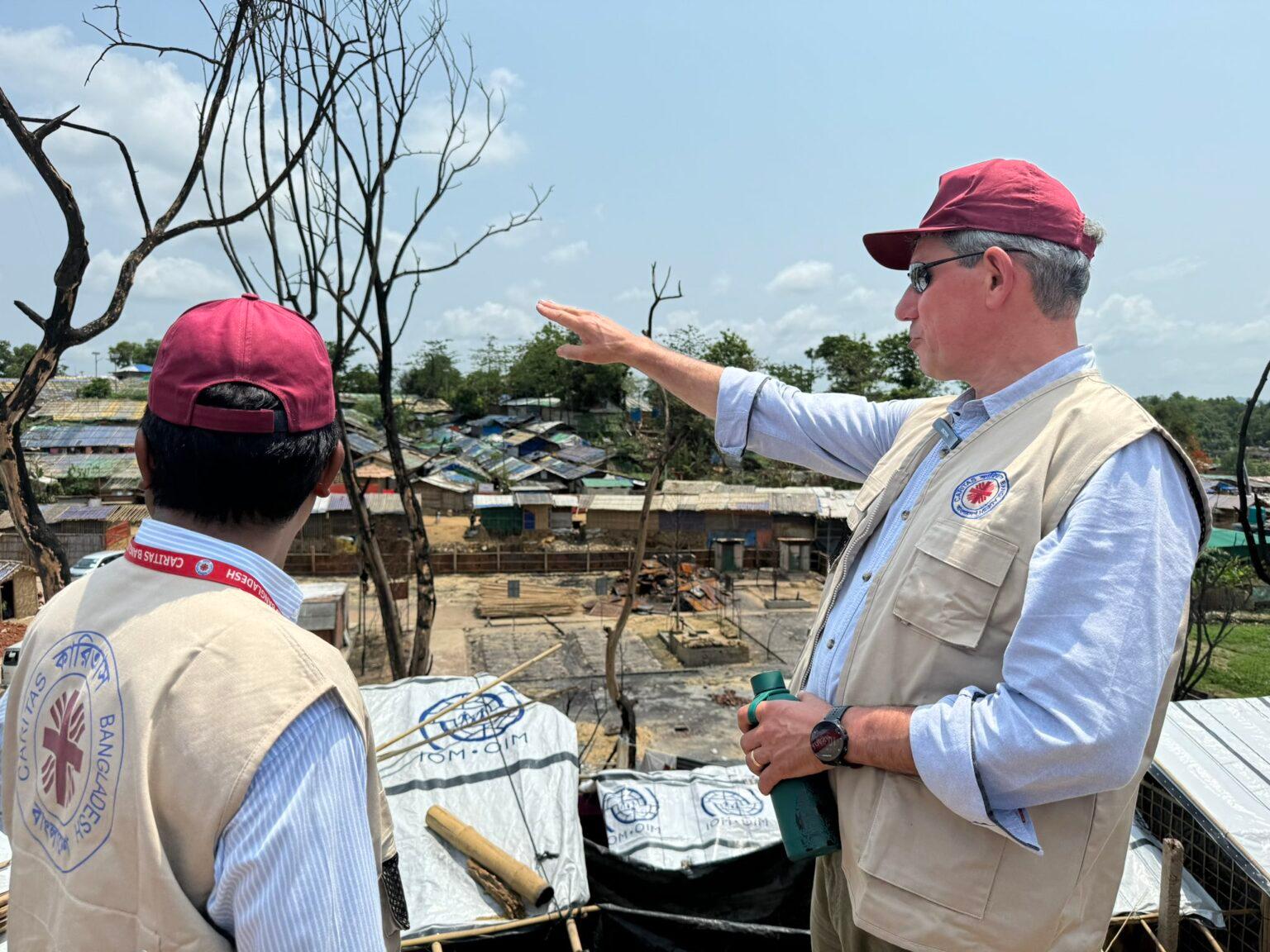MUMBAI, India – A leading Catholic aid agency says the Rohingya refugees in Bangladesh are “forgotten.”
Caritas Internationalis General-Secretary Alistair Dutton recently visited the population last week, and thanked the Bangladesh government for supporting the Rohingya for so many years.
Most of the Rohingya at the Bangladesh camps have arrived from Myanmar since August 2017, when the military began conducting clearance operations after a series of rebel attacks in Myanmar’s Rakhine state. The Rohingya are Muslims and have long faced discrimination in Buddhist-majority Myanmar, including being denied citizenship since 1982.
The military coup in Myanmar in February 2021 further heightened their vulnerability.
The population density of the camps is staggering: About 103,600 per square mile, more than 40 times the average population density in Bangladesh as a whole – and it is one of the most crowded countries on earth.
Refugees live in side-by-side plastic huts, each just a little larger than 100 square feet, and some holding a dozen residents.
“I am profoundly moved by the hospitality and enduring support that the Bangladesh government has shown for Rohingya refugees for the past seven years,” Dutton said.
“While the attention of the world has moved on, the Rohingya people continue to struggle by in these forgotten camps. But the Bangladesh Government can’t be expected to support them alone. Other countries need to step up with more funding for this crisis.”
In Cox’s Bazar, Dutton met with government, UN and NGO officials, while in the Bangladesh capital, Dhaka, he met with Church leaders.
“I met Alistair Dutton and the Caritas family at the reception hosted for them after their trip to Cox’s Bazaar, I shared my experience with them. I told them that I have visited Cox’s Bazaar five times since 2017, the latest was in March 2024 when I accompanied the nuncio,” Cardinal Patrick D’Rozario, Archbishop emeritus of Dhaka, told Crux.
“While the situation in the Rohingya camp is better since 2015, the people are living without hope. They get up every morning without any dream, no desire, they are growing up without a future. It is inhuman, they have nothing to do, this is not living,” the cardinal said.
“However, in the midst of limitations, I’m seeing a lot of change especially in places taken care of by Caritas,” he added.
“On my 2017 visit, children never came near us, we were strangers to them – but in March, children and women were dancing joyfully with us. The adolescent boys and girls were sharing freely with us: They were being made aware of possibilities for their future,” the cardinal continued.
I saw hope in their eyes. Human development is important, things can be done for them but how?” D’Rozario asked.
Dutton said the world must not forget the Rohingya people — or take the support of the Bangladesh government for granted.
“Rohingya families are among the most vulnerable people in our world today, living on marginal land, without the right to work,” the Caritas Internationalis leader said.
“Teenagers have now spent half of their life in these settlements. We must do more to ensure their safety now and their options for the future,” he said.
Between 2017-2023, Caritas says it has provided $45 million in emergency efforts for Rohingya and host community members in Cox’s Bazar and Bhasanchar. Caritas has committed to provide an additional $7 million in support for 2024.
“Over the past six years, more than 200,000 children have been born in the camps. They have never seen their home country and have no nationality,” Dutton said.
“They are stateless. This response requires renewed international attention and equitable burden-sharing by countries in the region and beyond, together with pressure on Myanmar for safe and dignified return of the Rohingya with their rights restored,” he added.
In January, Pope Francis – who visited both Myanmar and Bangladesh in 2017 – renewed his call for peace in the region and called on the world to not forget the Rohingya.
D’Rozario said the international community has not done enough to help.
“It is not possible for Bangladesh to do alone. There has to be an international integrated approach and sustainable solutions to help the Rohingyas,” the cardinal said.
While externally the situation looks improved, the stark reality is the dark side – there are cliques and gangs with outbursts of violence. But I also saw joy in the eyes of the people,” D’Rozario told Crux.















